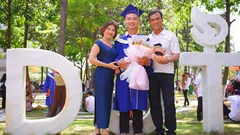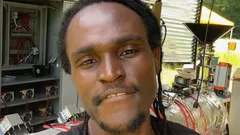
Imagine walking through the crowded campus of a university and having to deal with daily struggles not just with schoolwork—as well as the challenges that the world can throw in your way. Clarence Nayve was one of those students who graduated with magna cum laude despite being a PWD (Person with Disability). The story of his life is a ray of optimism, showing that there is no goal too big and no challenge that is too big for Filipinos determined to achieve. Learn more about the ways in which his story can inspire your own goals, no matter what they might be.
Clarence Nayve's Academic Journey: More Than Just Grades
Clarence was not just a regular university student. While the majority of his peers focused on passing exams—he had to handle his studies while adjusting to the demands of living being a cerebral-palsy sufferer. This neurological condition made everyday activities difficult—however Clarence took the power of determination and perseverance as tools. He was able to balance rigorous classes and a vibrant university life by refusing allow his physical limitations to determine his. Actually, he completed his first year at Polytechnic University of the Philippines with a high grade and was among the top percent of his class. It's a achievement that really stands out.
Support Systems That are important
For students with disabilities, the support of the community is essential. Clarence's story illustrates the virtues of inclusiveness and resilience that are embedded in Filipino culture. His classmates, teachers, and family members did not treat him differently. Instead—they praised him by offering support and practical assistance. This is a timely reminder of how being open in a school is a game changer for every student. The environment that was nurturing contributed in his growth and self-confidence.
"I tried to prove having a PWD is not a barrier in achieving academic excellence. The key is determination."
The Numbers Behind the Achievement
The figures tell a compelling story—the numbers show that there are more than 1.5 million people with disabilities across the country, yet only a tiny percentage of them are able to pursue higher education, and less of them have the opportunity to graduate with distinction. Clarence's success in the role of an awardee of the magna cum laude is more than just personal. It illuminates the lives of hundreds of thousands of young Filipinos and encourages them to achieve their goals regardless of odds.
Lessons Every Filipino Student Can Learn
- Consistency is crucial: Clarence maintained a strict schedule for studying, which included therapy and school.
- Get assistance when you need it—He didn't hesitate to seek guidance from his professors and mentors as well as friends.
- Celebrate small victories—Every exam he passed and project completed gave him the motivation to keep pushing higher.
- Mental health is the most important thing—He openly admitted that staying motivated and positive helped him through tough days.
Creating Inspiration, One Story at a Time
The reality for those who have disabilities is that stigma and accessibility issues persist. But stories like Clarence's—proof that every Filipino deserves the chance to receive high-quality education and a welcoming community. His accomplishments demonstrate that inclusion and compassion can change lives. Not just for people who have disabilities, but for all. When I think about Clarence's life, I am struck by the feeling of pride that is felt by many Filipinos when someone overcomes obstacles. It reminds me about the impact of motivation, resilience and academic motivation in shaping our dreams.
Stories like the one of Clarence Nayve demonstrate that with a strong determination and the right support—anyone can achieve their goals in academics, even in confronting of challenges. If you're looking for magna cum requirements for laude for the Philippines—Clarence's story is a great illustration of what's possible when perseverance and faith are joined.
 Meg Magazine
Meg Magazine














Comments